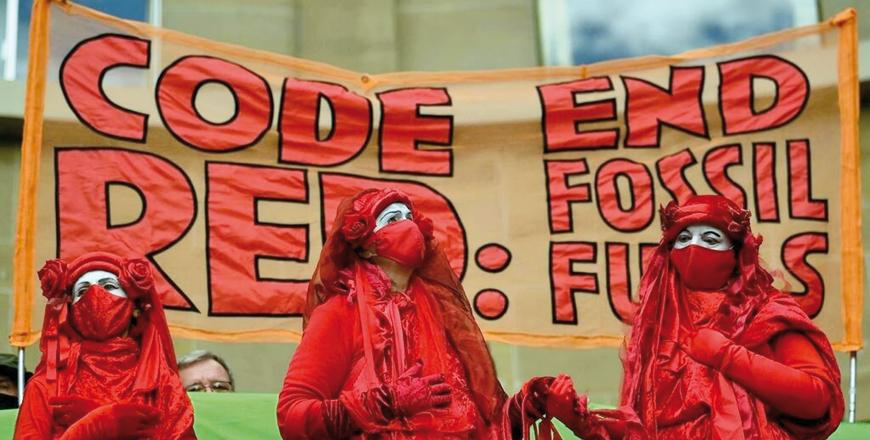You are here
Social tipping points: Slouching toward climate salvation
Mar 03,2021 - Last updated at Mar 03,2021
By Marlowe Hood
Agence France-Presse
PARIS — The world appears to have finally woken up to the existential threat of global warming, and the drive to fix the problem is accelerating across the board.
The planet’s biggest carbon polluters — China, US, EU — vow carbon neutrality by mid-century; solar and wind power continued to surge even as global GDP shrank five per cent last year; two-thirds of humanity see a “climate emergency”; a top-five automaker says it will only make zero-emissions vehicles after 2035; major investors recoil from coal, while fossil fuels companies shrivel in value.
Climate action cheerleaders are past masters at stringing together whatever signs of progress are at hand to conjure a glass half full, so good news laundry lists must be viewed sceptically.
There are arguably just as many reasons for pessimism.
Last week UN chief Antonio Guterres noted that — net-zero promises notwithstanding — “governments are nowhere close to the level of ambition needed to limit climate change to 1.5ºC and meet the goals of the Paris Agreement.”
The 2015 treaty calls for capping global warming at “well below” 2ºC compared to preindustrial levels, and the world is currently on track for double that.
On Tuesday, the International Energy Agency reported that global CO2 emissions have returned to pre-pandemic levels, and then some.
But in all sectors — energy, industry, geopolitics, finance, public opinion — a flurry of activity has experts wondering whether the world is, at long last, turning the corner on climate.
“Is the pendulum swinging hard in the right direction? Absolutely,” said Gernot Wagner, a climate economist at New York University.
“In the US, it’s Washington, it’s Detroit, it’s Silicon Valley, it’s Wall Street,” he added. “They didn’t wait for one another, it is all happening at the same time.”
The term for this sunny scenario is “social tipping point”, defined as a threshold leading irreversibly to a new state or paradigm, whether it be a shift to meat-free diets or — the ultimate goal — a global carbon-neutral economy.
Or electric vehicles (EV).
A decade ago, EVs barely registered in terms of market share, and a rapid phase out of the internal combustion engine seemed chimerical. Today, the EV revolution is well underway and, by most accounts, unstoppable.
Locking in
tipping points
Leading the charge is Norway, where electric vehicles accounted for 54 per cent of new car sales last year — three-quarters if plug-in hybrids are included in the tally.
The only other country in double digits is Iceland, and globally the EV market share in 2020 was less then 5 per cent.
“A global tipping point will come when EVs cost the same to manufacture as conventional cars,” said Tim Lenton, an Earth system scientist at the University of Exeter and lead author of recent research that takes Norway’s EV saga as a tipping points case study.
Rapid uptake is also helped by an about-face in consumer attitudes from wariness to wanting what others have, an example of “social contagion”.
By itself, Norway will never move the dial on global carbon emissions. But its pathbreaking example — including a ban on new carbon polluting cars after 2025 — has an outside influence and adds to gathering global momentum, Lenton and others say.
Britain and California will only allow the sale of emissions free vehicles from 2035, while China — already the largest EV market in the world — has said it will ban petrol- and diesel-fuelled cars from that date.
Industry has its leaders too.
Last month GM, the world’s fourth biggest carmaker, announced it would only sell emissions-free vehicles starting in 2035.
The soaring share value of EV pure player Tesla has recently made it’s CEO Elon Musk the richest person in the world.
“To see it coming both from the government side, and from major auto companies, this really signals that change is coming,” send Lenton.
Sometimes a “critical minority” is enough to lock in a tipping point, which can occur before its broader impact is visible.
Slavery and fossil fuels
Grassroots pressure on fund managers and their clients to unload fossil fuel stocks is a text-book example, Ilona Otto, head of the social complexity and system transformation research group at the University of Graz’s Wegener Centre for Climate and Global Change, told AFP.
“In the beginning it does matter why they do it, but later it matters less,” said Otto, lead author of a study on the social tipping dynamics needed to stabilise Earth’s climate by 2050.
“Simulations show that if about 9 per cent of investors divest, the rest will follow suit because they will be afraid of being left behind and losing money.”
The climate divestment movement, intertwined with social justice goals, can be compared to the drive to abolish slavery in late 18th and early 19th century, she said.
Both involved deeply rooted economic systems that actively resisted change. In the case of chattel slavery, a long unchallenged system came unravelled quickly and was soon seen as morally indefensible.
“We will get to a point where it will seem as unthinkable to use fossil fuel energy as it is to have slaves,” Otto said.
Meanwhile, the grassroots global climate movement that surged onto the world stage in 2019 — led, in part, by a then 16-year Greta Thunberg of Sweden — is still gaining momentum, even if a raging pandemic has obscured its scope.
“Concern about the climate emergency is far more widespread than we knew before,” Stephen Fisher, a sociologist at Oxford who helped design a survey of 1.2 million people across 50 countries, told AFP.
“And the large majority of those who do recognise a climate emergency want urgent and comprehensive action.”
Beyond morality, there comes a point in major social transitions when rejecting the status quo and adopting new norms becomes the most rational option economically.
“Even in red [Republican] states, solar panels are popular,” noted James Williams, a professor at the University of San Francisco and lead author of a recent study outlining plausible pathways for US carbon neutrality by 2050.
Not long ago, the Chinese government viewed the concept of carbon neutrality as an economic burden, Pan Jiahua, the director of the Institute of Eco-civilisation Studies at Beijing University of Technology, told the Atlantic Council last month.
Today, however, “we have a consensus that it’s an opportunity for employment, growth, and the transformation of society.”
Part of this expanding consensus recognises that powering the world economy with fossil fuels is no longer compatible with civilisation as we know it.
A race we can not
afford to lose
But that hard truth clashes with another: Coal, oil and gas still account for nearly 85 per cent of global energy supply, and are subsidised to the tune of half-a-trillion dollars every year, both for consumers and producers, according to the OECD.
How that tension will be played out — and how quickly — remains to be seen, but there can be no doubt that fossil fuel companies are feeling the heat.
“The cyclical shock of COVID has brought forward a structural peak in emissions, which was going to happen anyway,” Kingsmill Bond, senior energy analyst at financial think tank Carbon Tracker, told AFP.
“Before the crisis, renewables had almost reached a tipping point and now, in future, all growth in demand for energy can be satisfied with renewable sources,” said Bond, a former sell-side equity analyst at major banks.
“As soon as this happens, you by definition get peak fossil fuel demand, and therefore peak emissions,” he added, raising the possibility that 2019 — the last year unaffected by the COVID crisis — may be that peak.
Ultimately, the separate strands of climate action must coalesce into a greater-than-the-sum-of-its-parts whole.
“A synergy is needed for large-scale change to unfold,” said Jonathan Donges, co-leader of the FutureLab of Earth Resilience in the Anthropocene at the Potsdam Institute for Climate Impact Research.
Social tipping points have an evil twin in the climate system, where Lenton and other Earth system scientists have identified 15 temperature trip wires for irreversible and potentially catastrophic change.
A world that has warmed 2ºC above preindustrial levels could push the melting of icesheets atop Greenland and West Antarctic — with enough frozen water to lift oceans 13 metres — past a point of no return.
Other tipping points could see the Amazon basin turn from tropical forest to savannah; billions of tonnes of carbon leech from Siberia’s permafrost; the disappearance of the polar ice cap in summer.
Taken together, these changes could punch a one-way ticket to what scientists call “hothouse Earth”, a profoundly inhospitable state the planet has not known for tens of millions of years.
“But of course there’s a fundamental difference between ice sheets and social systems,” said Lenton. “We have the foresight to change our course of action.”
In a very real sense, then, humanity is in a race it cannot afford to lose.
“If we want to avoid the bad tipping points, we need to trigger the good, or social tipping points,” Lenton added.
“We have left it too late to tackle climate change incrementally.”
Related Articles
By Marlowe HoodAgence France-PressePARIS — We ignored the warnings, and now it’s too late: Global heating has arrived with a vengeance and w
WASHINGTON — The United States announced a clean energy partnership on Tuesday with the United Arab Emirates worth $100 billion, the White H
PARIS — Across a quarter century of UN climate conferences tasked with saving humanity from itself, one was deemed a chaotic failure (Copenh

















